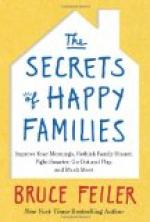“Mama!” breathed Weary, in a horrified half-whisper.
And Slim, goggle-eyed beside him, blurted, “Well, by golly!” in a voice that carried across the corral.
For Andy Green, tamer of wild ones (forsooth!) broncho-twister with a fame that not the boundary of Chouteau County held, nor yet the counties beyond; Andy Green, erstwhile “Andre de Greno, champion bare-back rider of the Western Hemisphere,” who had jumped through blazing hoops and over sagging bunting while he rode, turned handsprings and done other public-drawing feats, was prosaically, unequivocally “piled” at the fifth jump!
That he landed lightly on his feet, with the cigarette still between his lips, the roosting twenty-five quite overlooked. They saw only the first jump, where Andy, riding loose and unguardedly, went up on the blue withers. The second, third and fourth jumps were not far enough apart to be seen and judged separately; as well may one hope to decide whether a whirling wheel had straight or crooked spokes. The fifth jump, however, was a masterpiece of rapid-fire contortion, and it was important because it left Andy on the ground, gazing, with an extremely grieved expression, at the uninterrupted convolutions of the “dandy little cow-hoss.”
The blue roan never stopped so much as to look back. He was busy—exceedingly busy. He was one of those perverted brutes which buck and bawl and so keep themselves wrought up to a high pitch—literally and figuratively. He set himself seriously to throw Andy’s saddle over his head, and he was not a horse which easily accepts defeat. Andy walked around in the middle of the corral, quite aimlessly, and watched the roan contort. He could not understand in the least, and his amazement overshadowed, for the moment, the fact that he had been thrown and that in public and before men of the Diamond G.
Then it was that the men of the Diamond G yelled shrill words of ironical sympathy. Then it was that the Happy Family looked at one another in shamed silence, and to the taunts of the Diamond Gs made no reply. It had never occurred to them that such a thing could happen. Had they not seen Andy ride, easily and often? Had they not heard from Pink how Andy had performed that difficult feat at the Rocking R—the feat of throwing his horse flat in the middle of a jump? They waited until the roan, leaving the big corral looking, in the fast deepening twilight, like a fresh-ploughed field, stopped dejectedly and stood with his nose against the closed gate, and then climbed slowly down from the top rail of the corral, still silent with the silence more eloquent than speech in any known language.
Over by the gate, Andy was yanking savagely at the latigo; and he, also, had never a word to say. He was still wondering how it had happened. He looked the roan over critically and shook his head against the riddle; for he had known him to be a quiet, dependable, all-round good horse, with no bad traits and an easy-going disposition that fretted at nothing. A high-strung, nervous beast might, from rough usage and abuse, go “bad”; but the blue roan—they had called him Pardner—had never showed the slightest symptom of nerves. Andy knew horses as he knew himself. That a horse like Pardner should, in two years, become an evil-tempered past-master in such devilish pitching as that, was past belief.




